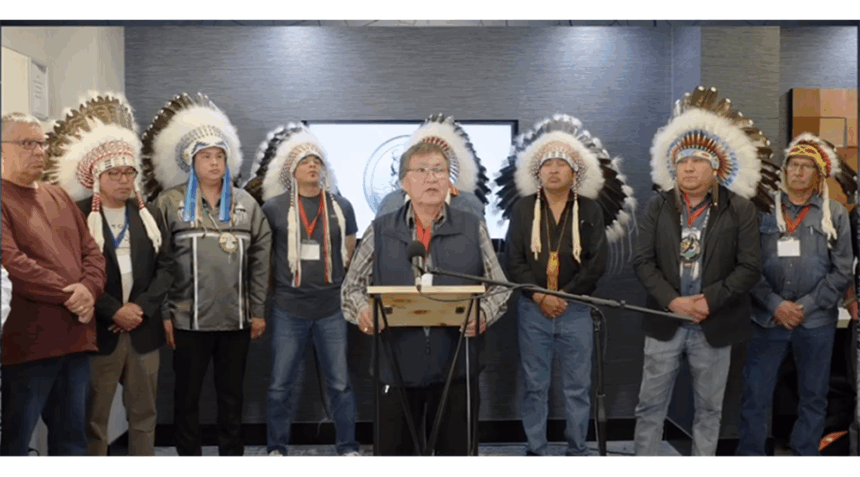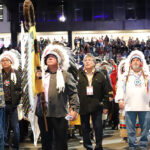Dene Tha’ First Nation Chief Wilfred Hooka-Nooza. (Screenshot) By Jeremy Appel, Local Journalism Initiative Reporter (ANNews) – Four northwestern Alberta First Nations have launched a legal challenge of the provincial government’s decision to sell more than 15,000 acres of Crown land to Mackenzie County for agricultural development. Collectively known as the Nations of the North Peace, Dene Tha’ First Nation, Beaver First Nation, Tallcree Tribal Government and Little Red River Cree Nation are asking the Court of King’s Bench to reverse the third and final stage of a process that was done without sufficient consultation or consideration of their Treaty rights. The Nations of the North Peace announced their request for judicial review with an Oct. 6 news release. In 2010, then-premier Ed Stelmach began auctioning off 136,000 acres of public land in Peace Country to Mackenzie County to develop for agriculture and grazing. About 120,700 acres of that land was sold in two stages from 2011 to 2013. In late 2018, then-UCP leader Jason Kenney announced his decision to sell the remaining 15,300 acres if he was elected premier, arguing that he didn’t need to consult First Nations because “this is not land in a reserve or Treaty area, it’s Crown land and it’s land that belongs to Albertans which is not being put to economic use.” Treaty 8 First Nations of Alberta Grand Chief Arthur Noskey noted at the time that Crown land is Treaty land, which First Nations have historically used for hunting, fishing, trapping and cultural practices. In October 2021, the UCP government reiterated its plan to complete the third stage of the Crown land sales to Mackenzie County, which the Nations of the Northern Peace are attempting to halt in court. They argue that the provincial government’s consultation process was confined to “site-specific,” rather than “cumulative impacts,” was the product of a “pre-determined commitment” to sell the land, ignored First Nations’ submissions about the land’s cultural and ecological significance, lacked “sufficient capacity funding” to ensure “meaningful First Nations participation,” and violated Treaty and constitutional rights. “This is not just about one land sale,” said Chief Wilfred Hooka-Nooza of the Dene Tha’ First Nation. “This is about a pattern – stretching back to the 1990s – where Alberta continues to erode our traditional territories without considering the cumulative impacts. Alberta has breached its duty to consult and ignored our rights under Treaty 8.” An October 2025 report from the Alberta Wilderness Association (AWA) that analyzes Crown land sales from 1990 to 2022 found that Mackenzie County was the “consistently highest” beneficiary of public land sales, in both size and volume. “Mackenzie County contains extensive boreal forest, as well as several important wetlands, which provide important habitat and ecological services. Wetlands are especially valuable for filtering water, mitigating flood and drought, and carbon storage,” the report notes. In February 2022, the AWA cautioned against the UCP government proceeding with the stage three land sales, citing their ecological impact on wildlife. Tall Cree Tribal Government Chief Rupert Meneen emphasized that the Nations aren’t “opposed to all development,” but want to be included in the decisionmaking process. For the Nations, this means ensuring that enough land – of sufficient ecological and cultural quality – remains for our People to hunt, fish, trap, and live according to our traditions, now and for generations to come,” said Meneen. “The Nations take these Treaty promises seriously, even when the Government of Alberta does not.” In addition to preventing the stage three land sale, the Nations of the Northern Peace are asking the court to mandate that the province operate “at the deep end of the consultation spectrum” when selling Crown land, prohibit further land sales to Mackenzie County until the First Nations in question are consulted adequately, and uphold the Crown’s existing obligation towards the “spirit and intent” of Treaty 8. Beyond the third stage of the land transfer, Mackenzie County is asking for the province to transfer an additional 350,000 acres of Crown land for future development and expansion. This makes the Nations of the Northern Peace’s application “particularly urgent,” says lawyer Jeff Langlois, who’s representing the First Nations in court. “The Nations are seeking a cooperative and defensible approach to land use planning – one that reflects not only the interests of Mackenzie County but also the ecological and cultural priorities of their neighbours in the Nations of the North Peace, who hold constitutionally protected rights,” he added.
Wednesday, 4 Feb 2026
Canada – The Illusion
Search
Have an existing account?
Sign In
© 2022 Foxiz News Network. Ruby Design Company. All Rights Reserved.
You May also Like
- More News:
- history
- Standing Bear Network
- John Gonzalez
- ᐊᔭᐦᑊ ayahp — It happened
- Creation
- Beneath the Water
- Olympic gold medal
- Jim Thorpe
- type O blood
- the bringer of life
- Raven
- Wás’agi
- NoiseCat
- 'Sugarcane'
- The rivers still sing
- ᑲᓂᐸᐏᐟ ᒪᐢᑿ
- ᐅᑳᐤ okâw — We remember
- ᐊᓂᓈᐯᐃᐧᐣ aninâpêwin — Truth
- This is what it means to be human.
- Nokoma











